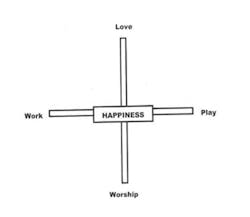Are you happy as a dentist? Be honest. The Pankey philosophy can help you find happiness
According to this expert, love, play, work, and worship all come together to form happiness. This is a philosophy adopted by the Pankey Institute. But reading about it and actually practicing it can be two different things. Here are some tips to get you started on the road to true happiness.
Richard Cabot (1869-1939) was a physician, philosopher, and Unitarian minister. He started his clinical work at Massachusetts General Hospital where he established the country’s first hospital-based Social Service department. He wrote 12 books related to medicine and ethics. He also started a continuing medical education program known as the Cabot Cases for the New England Journal of Medicine. Physician study clubs throughout the country would read the Cabot Cases, which consisted of patient symptoms and lab tests. The physicians discussed the diagnosis for the patients, and Dr. Cabot published the diagnosis in the Journal the following month.George Crane, PhD, a clinical psychologist and faculty member at Northwestern University, introduced Dr. LD Pankey to Dr. Cabot's work. Dr. Crane lectured about how to best understand and communicate with patients. One of the books Dr. Crane assigned was, “What Men Live By,” by Dr. Cabot, in which he explored ways to achieve individual happiness.
Dr. Cabot said, “To be happy it is necessary to strive for balance in your personal life.” He explained the importance of balance via a simple diagram with “Happiness” in the middle and four arms labeled Work, Play, Love, and Worship. The diagram became known as the Cabot Cross. Cabot’s book was published in 1913 and has long been out of print, but the basic principle of a balanced life has stood the test of time.
There are needs in all of us to be productive, enjoy daily life, have people in our lives that we care about, and extend our interests beyond ourselves. An excess or a deprivation of any of these basic needs can set our lives out of balance and destroy our sense of self-worth. As Dr. Pankey developed his philosophy, he used the Cabot Cross as a starting point for dentists trying to find balance in their practice and personal life.
Happiness is the purpose of any philosophy
What is happiness? The ethical practice in dentistry stems from the desire to do the best work possible for patients, and the consistent practice to perfect the art and science of dentistry. Happiness within the practice of dentistry lies not so much in material compensation or professional recognition, but in the spiritual regard of serving patients well. Financial regard and the esteem of others come as a natural outgrowth of these services.
Happiness means something slightly different to everyone. It’s based on individual objectives, temperament, and circumstances. But it’s important to everyone that their basic needs are met. It is an important part of the Pankey Philosophy to create balance in life for the sake of physical, mental, spiritual, and emotional health. The Cabot Cross can help define what is and is not balanced in a person’s life.
Work
A balanced life requires challenging work that’s enjoyable for the most part. All work can feel unexciting from time to time, but the overall feeling should be one of enjoyment and appreciation. Some characteristics of a satisfying work-life are:
• Enough variety and predictability to suit your aims, goals, objectives,circumstances, and temperament—Some people thrive on variety, newness, and unpredictability. Others work best in a stable, predictable setting. Self-knowledge is the first step toward creating a satisfying work life.
• Enough challenge to call upon your powers of mastery—Studies show that people who are most resistant to the effects of stress enjoy being challenged by their work. Many great artists, writers, and musicians lived long and productive lives facing the ongoing challenges of their creative endeavors.
• A realistic workload—While challenge can be a healthy thing, too much challenge can be overwhelming. The constant feeling of being behind, of never quite catching up, or of making deadlines can lead to distress and illness.
• A boss, even if it is yourself—People who say “It must be nice being your own boss” miss the point. They equate being your own boss with having no boss at all. Everyone requires management, supervision, and feedback to do their best work. If you are your own boss, you must be a successful manager to yourself.
• A chance to achieve, create, and see the fruits of your labor—Much has been written about the efficiency of Japanese workers, largely attributed to their participation in workplace decisions. They feel a sense of achievement in their work and pride in their products. The greater the sense of accomplishment, the higher the quality of work, and the more satisfaction felt on the part of the workers.
• A chance to be absorbed in the work—Most people have had a job where they watched the clock and wished the day would be over. This is a tragedy. With life as brief and precious as it is, work should be interesting and absorbing so that time slips by quietly and unnoticed.
• Recognition and compensation with appreciation—Work without acknowledgment or compensation is ultimately demoralizing. For continued happiness and productivity, reward, in the form of financial compensation, praise, recognition and/or acknowledgment, is imperative.
• Work-life as a step toward worthy goals—One thing that distinguishes humans from other life forms is a sense of purpose and destiny. Albert Schweitzer sums it up well: “It is not enough merely to exist. It’s not enough to say, ‘I’m earning enough to live and to support my family. I do my work well. I am a good father. I am a good husband. I am a good church goer.’ That’s all very well. But you must do something more. Seek always to do some good, somewhere. Every man has to seek in his own way to make his own self more noble and to realize his own true worth.”
How is your work life? Do you have too much challenge or not enough? Are you bored or stimulated? How do you feel about work when you get up each morning and leave each day? Do you feel what you do is worthwhile? Do you accomplish things? How do you feel about your patients, staff, and associates? Are you getting enough recognition and compensation? Does your daily work relate to your lifetime goals?
Play
Play is not merely recreation, it is “re-creation,” the child-like spirit that helps people renew themselves through their activities, including work. In the book “What men live by,” Dr. Cabot compares the way a child walks to school—alive, aware, wandering, wondering—and the way many adults trudge to work—solemn, self-absorbed, head down, unaware of their surroundings. Notice how you walk down the street. What “background music” accompanies you? Is it a funeral dirge? Try an experiment by smiling, breathing deeply, and noticing your surroundings, even if you don’t feel like it. You’ll be amazed at how positively people respond to you.
“Play keeps the soul alive,” said Dr. Cabot. Play can be revitalizing, particularly in situations of overwork and stress. Play is a means of expression. “All work and no play makes Jack a dull boy.” But it’s more than “dull boy” insurance. It is an end in itself, a way of expressing yourself in the world.
Another dimension of play is creation. There is an element of artistry in dentistry, but many dentists also find pleasure in other forms of artistic creation, such as gardening, making stained glass windows, cabinet-making, restoring antique automobiles, and glass blowing. Creativity can be therapeutic as well as fun.
Is there enough play in your life? Do you enjoy leisure activities with family and friends? Do you find yourself talking shop even while playing golf? When was the last time you asked a waitress or cab driver if she or he had heard any good jokes? What activities do you do for the sheer pleasure of doing them? The longer you wait, the more you will miss.
For the most current dental headlines, click here.
Watch for Part 2 of this article about love and worship in an upcoming DE's Expert Tips & Tricks e-newsletter.


